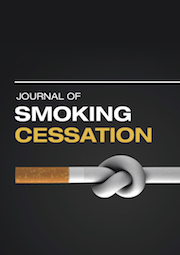Crossref Citations
This article has been cited by the following publications. This list is generated based on data provided by
Crossref.
Arbour-Nicitopoulos, Kelly P.
Faulkner, Guy E.
Hsin, Agnes
and
Selby, Peter
2011.
A pilot study examining the acute effects of exercise on cigarette cravings and affect among individuals with serious mental illness.
Mental Health and Physical Activity,
Vol. 4,
Issue. 2,
p.
89.
Roberts, Vaughan
Maddison, Ralph
Simpson, Caroline
Bullen, Chris
and
Prapavessis, Harry
2012.
The acute effects of exercise on cigarette cravings, withdrawal symptoms, affect, and smoking behaviour: systematic review update and meta-analysis.
Psychopharmacology,
Vol. 222,
Issue. 1,
p.
1.
Haasova, Marcela
Warren, Fiona C.
Ussher, Michael
Janse Van Rensburg, Kate
Faulkner, Guy
Cropley, Mark
Byron‐Daniel, James
Everson‐Hock, Emma S.
Oh, Hwajung
and
Taylor, Adrian H.
2013.
The acute effects of physical activity on cigarette cravings: systematic review and meta‐analysis with individual participant data.
Addiction,
Vol. 108,
Issue. 1,
p.
26.
Ledochowski, Larissa
Taylor, Adrian H.
Haasova, Marcela
Faulkner, Guy E.
Ussher, Michael H.
and
Kopp, Martin
2013.
Unmittelbare Auswirkungen einzelner Bewegungseinheiten auf das Bedürfnis zu rauchen.
Zeitschrift für Gesundheitspsychologie,
Vol. 21,
Issue. 3,
p.
122.
Fong, Angela J.
De Jesus, Stefanie
Bray, Steven R.
and
Prapavessis, Harry
2014.
Effect of exercise on cigarette cravings and ad libitum smoking following concurrent stressors.
Addictive Behaviors,
Vol. 39,
Issue. 10,
p.
1516.
Schneider, Terri
De Jesus, Stefanie
and
Prapavessis, Harry
2015.
The Effect of Acute Exercise on Smoking Topography: No Evidence for Cutting Down One Puff at a Time.
Journal of Smoking Cessation,
Vol. 10,
Issue. 2,
p.
146.
De Jesus, Stefanie
Hsin, Agnes
Faulkner, Guy
and
Prapavessis, Harry
2015.
A systematic review and analysis of data reduction techniques for the CReSS smoking topography device.
Journal of Smoking Cessation,
Vol. 10,
Issue. 1,
p.
12.
Mitsuishi, Hisashi
and
Takenaka, Koji
2016.
Effects of physical exercise and nicotine patches on the desire to smoke when introducing smoking cessation to young smokers.
The Japanese Journal of Health Psychology,
Vol. 28,
Issue. Special_issue,
p.
151.
Mitsuishi, Hisashi
2016.
Smoking cessation for preventing lifestyle-related diseases.
The Japanese Journal of Health Psychology,
Vol. 28,
Issue. Special_issue,
p.
135.
Underner, M.
Perriot, J.
Peiffer, G.
and
Meurice, J.-C.
2016.
Effets de l’activité physique sur le syndrome de sevrage et le craving à l’arrêt du tabac.
Revue des Maladies Respiratoires,
Vol. 33,
Issue. 6,
p.
431.
Cooke, L.M.
Fitzgeorge, L.
Hall, C.R.
and
Prapavessis, H.
2016.
Imagine that: Examining the Influence of Exercise Imagery on Cigarette Cravings and Withdrawal Symptoms.
Journal of Smoking Cessation,
Vol. 11,
Issue. 1,
p.
28.
Lamarche, Larkin
Ozimok, Brianne
Gammage, Kimberley L.
and
Muir, Cameron
2017.
Men Respond Too: The Effects of a Social-Evaluative Body Image Threat on Shame and Cortisol in University Men.
American Journal of Men's Health,
Vol. 11,
Issue. 6,
p.
1791.
Angeli, Maria
Hatzigeorgiadis, Antonis
Comoutos, Nikos
Krommidas, Charalampos
Morres, Ioannis D.
and
Theodorakis, Yannis
2018.
The effects of self-regulation strategies following moderate intensity exercise on ad libitum smoking.
Addictive Behaviors,
Vol. 87,
Issue. ,
p.
109.
Gass, Julie C.
and
Tiffany, Stephen T.
2020.
Assessment of the Choice Behavior Under Cued Conditions (CBUCC) paradigm as a measure of motivation to smoke under laboratory conditions.
Addiction,
Vol. 115,
Issue. 2,
p.
302.
Seet, Vanessa
Abdin, Edimansyah
Asharani, P. V.
Lee, Ying Ying
Roystonn, Kumarasan
Wang, Peizhi
Devi, Fiona
Cetty, Laxman
Teh, Wen Lin
Verma, Swapna
Mok, Yee Ming
and
Subramaniam, Mythily
2021.
Physical activity, sedentary behaviour and smoking status among psychiatric patients in Singapore – a cross-sectional study.
BMC Psychiatry,
Vol. 21,
Issue. 1,
Belsare, Prajakta
Senyurek, Volkan Y
Imtiaz, Masudul H
Betts, Jennifer
Motschman, Courtney A.
Dowd, Ashley N.
Tiffany, Stephen T.
and
Sazonov, Edward
2022.
Analyzing Impact of Mouthpiece-based Puff Topography Devices on Smoking Behavior using Wearable Sensors.
p.
1787.
Klamert, Lisa
Craike, Melinda
Bedi, Gillinder
Kidd, Susan
Pascoe, Michaela C.
and
Parker, Alexandra G.
2023.
Behaviour change techniques in physical activity‐focused interventions for young people at risk of problematic substance use: A systematic review and meta‐analysis.
Early Intervention in Psychiatry,
Vol. 17,
Issue. 12,
p.
1139.
Zhou, Yuehui
Feng, Wenxia
Guo, Yugang
and
Wu, Juhua
2023.
Effect of exercise intervention on smoking cessation: a meta-analysis.
Frontiers in Physiology,
Vol. 14,
Issue. ,
Klamert, Lisa
Bedi, Gillinder
Craike, Melinda
Kidd, Susan
Pascoe, Michaela C.
and
Parker, Alexandra G.
2023.
Physical activity interventions for young people with increased risk of problematic substance use: A systematic review including different intervention formats.
Mental Health and Physical Activity,
Vol. 25,
Issue. ,
p.
100551.
Schöttl, Stefanie E.
Insam, Kathrin
Frühauf, Anika
Kopp-Wilfling, Prisca
Holzner, Bernhard
and
Kopp, Martin
2024.
Acute effects of outdoor and indoor walking on cigarette cravings, withdrawal symptoms and affective response during temporary smoking abstinence.
Psychopharmacology,
Vol. 241,
Issue. 4,
p.
739.


